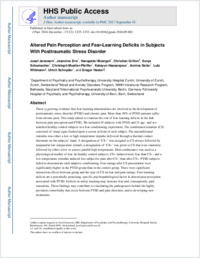Altered Pain Perception and Fear-Learning Deficits in Subjects With Posttraumatic Stress Disorder
DOKPE
- Jenewein, Josef University of Zurich, Switzerland
- Erni, Jeannine University of Zurich, Switzerland
- Moergeli, Hanspeter University of Zurich, Switzerland
- Grillon, Christian NIMH Intramural Research Program, Bethesda, Maryland, US
- Schumacher, Sonja University of Zurich, Switzerland
- Mueller-Pfeiffer, Christoph University of Zurich, Switzerland
- Hassanpour, Katayun University of Zurich, Switzerland
- Seiler, Annina University of Zurich, Switzerland
- Wittmann, Lutz International Psychoanalytic University, Berlin, Germany
- Schnyder, Ulrich University of Zurich, Switzerland
- Hasler, Gregor ORCID University of Bern, Switzerland ; [University of Fribourg]
- 2016
Published in:
- The Journal of Pain. - Amsterdam : Elsevier BV. - 2016, vol. 17, no. 12, p. 1-20 [1325-1333]
Anesthesiology and Pain Medicine
Neurology (clinical)
Neurology
Anxiety
Fear
Fear-learning
Chronic pain
Post-traumatic stress disorder
PTSD
English
There is growing evidence that fear learning abnormalities are involved in the development of posttraumatic stress disorder (PTSD) and chronic pain. More than 50% of PTSD patients suffer from chronic pain. This study aimed to examine the role of fear-learning deficits in the link between pain perception and PTSD. We included 19 subjects with PTSD and 21 age- and sex-matched healthy control subjects in a fear-conditioning experiment. The conditioned stimulus (CS) consisted of visual signs flashed upon a screen in front of each subject. The unconditioned stimulus was either a low or high temperature impulse delivered through a thermal contact thermode on the subjects’ hand. A designation of ‘CS−’ was assigned to CS always followed by nonpainful low-temperature stimuli; a designation of ‘CS+’ was given to CS that were randomly followed by either a low or a more painful high temperature. Skin conductance was used as a physiological marker of fear. In healthy control subjects, CS+ induced more fear than CS−, and a low-temperature stimulus induced less subjective pain after CS− than after CS+. PTSD subjects failed to demonstrate such adaptive conditioning. Fear ratings after CS presentation were significantly higher in the PTSD group than in the control group. There were significant interaction effects between group and the type of CS on fear and pain ratings. Fear-learning deficits are a potentially promising, specific psychopathological factor in altered pain perception associated with PTSD. Deficits in safety learning may increase fear and, consequently, pain sensations. These findings may contribute to elucidating the pathogenesis behind the highly prevalent comorbidity that exists between PTSD and pain disorders, and to developing new treatments.
- Faculty
- Faculté des sciences et de médecine
- Department
- Master en médecine
- Language
-
- English
- Classification
- Pathology, clinical medicine
- License
- Open access status
- green
- Identifiers
-
- DOI 10.1016/j.jpain.2016.09.002
- ISSN 1526-5900
- Persistent URL
- https://folia.unifr.ch/unifr/documents/327679
Statistics
Document views: 53
File downloads:
- jeneweinetal.2016: 86
